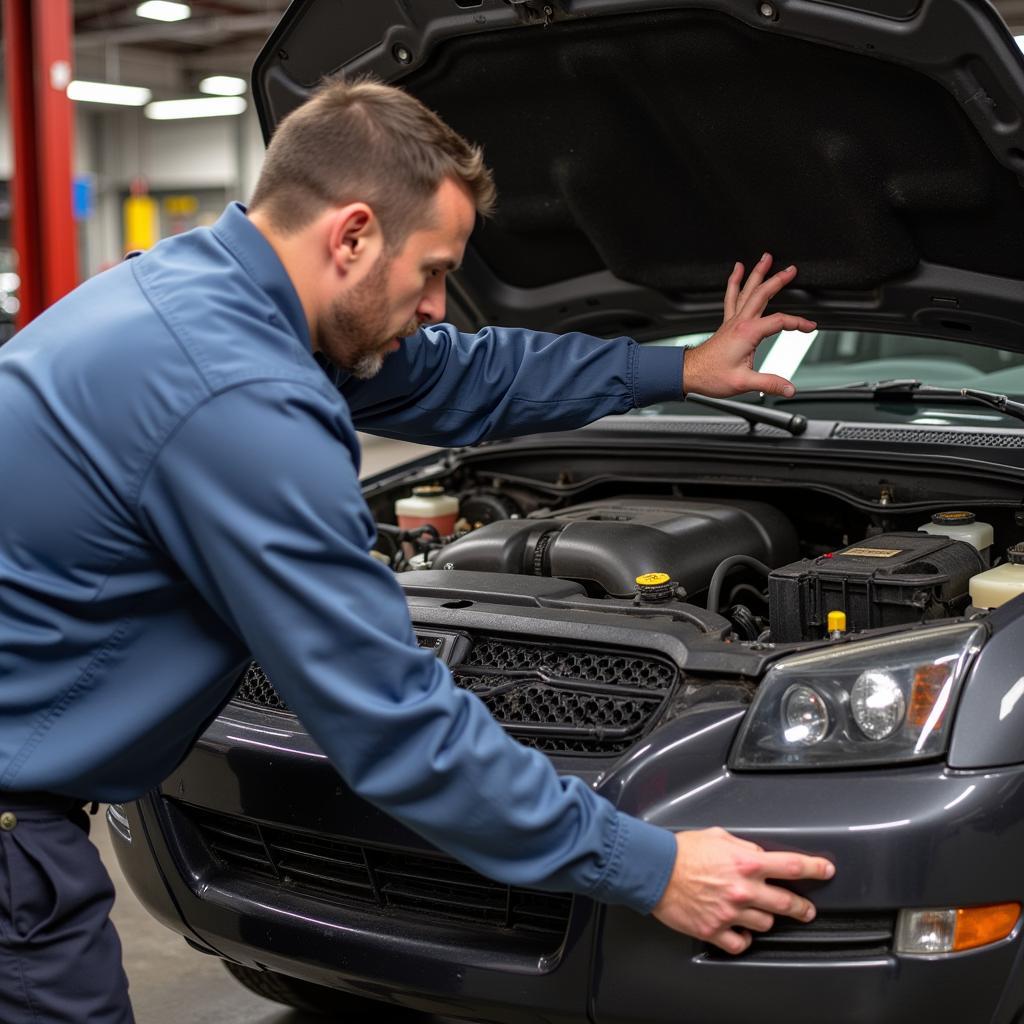The dreaded P0420 code. If you’re a Chevy owner, this string of numbers and a letter might send shivers down your spine. This code, specifically “OBD2 P0420 Chevy,” indicates a potential issue with your vehicle’s catalytic converter system, a critical component for emissions control. This article will delve into the P0420 code, explaining its meaning, common symptoms, and potential solutions.
Decoding the OBD2 P0420 Code on Your Chevy
The “P0420” code itself is a standardized diagnostic trouble code (DTC) used across most car manufacturers, including Chevrolet. Seeing this code on your OBD2 scanner means the system has detected that the catalytic converter is not operating at its optimal efficiency.
This doesn’t automatically mean a complete catalytic converter failure. Often, the problem originates from other components affecting the system’s performance.
Common Symptoms of a P0420 Code
While the check engine light illuminating is the primary indicator of a P0420 code, other symptoms can manifest, such as:
- Reduced Fuel Economy: A drop in your Chevy’s gas mileage can signify a catalytic converter problem.
- Sluggish Engine Performance: You might notice a decrease in your engine’s power and acceleration.
- Failed Emissions Test: A faulty catalytic converter will likely result in failing an emissions test.
- Rotten Egg Smell: A strong sulfurous odor from your exhaust is a telltale sign of a malfunctioning catalytic converter.
What Causes a P0420 Code in Chevy Vehicles?
Several culprits can trigger the P0420 code in your Chevy. Here are some of the most common:
- Faulty Catalytic Converter: While not always the case, a damaged or worn-out catalytic converter is a likely cause, especially in high-mileage vehicles.
- Malfunctioning Oxygen Sensors: Oxygen sensors (upstream and downstream) monitor the exhaust gases before and after the catalytic converter. If they send inaccurate readings, it can trigger the P0420 code.
- Exhaust Leaks: Leaks in your Chevy’s exhaust system before the catalytic converter can disrupt exhaust flow and skew oxygen sensor readings, leading to the code.
- Engine Misfires: If your engine misfires, unburnt fuel can enter the exhaust system and damage the catalytic converter over time, triggering the P0420 code.
- Faulty Spark Plugs: Worn-out spark plugs can also lead to engine misfires and ultimately contribute to catalytic converter issues.
Diagnosing the Root Cause of the P0420 Code
Pinpointing the exact cause of the P0420 code requires a systematic diagnostic approach. Here’s a step-by-step guide:
- Read the Code: Start by connecting an OBD2 scanner to your Chevy’s diagnostic port and reading the stored codes.
- Inspect the Exhaust System: Visually examine the exhaust system for any visible leaks or damage, particularly around the catalytic converter.
- Check the Oxygen Sensors: Examine the wiring and connections of both oxygen sensors. Use a multimeter to test their operation according to your Chevy’s specific specifications.
- Analyze Engine Performance: Look for signs of engine misfires, such as rough idling, hesitation during acceleration, or decreased fuel efficiency.
- Consult a Professional: If you’re uncomfortable performing these diagnostics or cannot pinpoint the cause, it’s best to consult a qualified mechanic specializing in Chevy vehicles.
Fixing the OBD2 P0420 Code in Your Chevy
Once you’ve identified the culprit behind the P0420 code, you can proceed with the necessary repairs.
- Catalytic Converter Replacement: If the catalytic converter is confirmed as faulty, it typically requires replacement.
- Oxygen Sensor Replacement: Faulty oxygen sensors need to be replaced to ensure accurate exhaust readings.
- Exhaust Leak Repair: Any exhaust leaks must be addressed by a qualified mechanic to restore proper exhaust flow.
- Engine Tune-Up: Address engine misfires by replacing faulty spark plugs, ignition coils, or other relevant components.
Preventing Future P0420 Codes in Your Chevy
Prevention is always better than cure. Here are some tips to help prevent the P0420 code from recurring:
- Regular Maintenance: Follow your Chevy’s recommended maintenance schedule, including timely oil changes, spark plug replacements, and air filter inspections.
- High-Quality Fuel: Using high-quality fuel can help prevent deposits from forming in the catalytic converter and oxygen sensors.
- Address Engine Issues Promptly: Don’t ignore engine misfires or other performance issues as they can lead to catalytic converter problems.
Understanding OBD2 Codes for Your Chevy
Familiarizing yourself with your Chevy’s onboard diagnostics is essential for car owners. Understanding these codes can provide valuable insights into your vehicle’s health and help you address potential problems promptly. For in-depth information on specific OBD2 codes, you can refer to resources like our OBD2 Diagnostic Codes page.
Getting to the Bottom of Chevy S10 OBD2 Codes
When dealing with a Chevy S10, understanding the specific OBD2 codes related to this model is crucial. You can find comprehensive information tailored to Chevy S10 OBD2 Codes on our website.
How to Check Codes on Chevy OBD2 Systems
Knowing how to check the codes on your Chevy’s OBD2 system is the first step in diagnosis. Our guide on How to Check Codes on Chevy OBD2 systems can walk you through the process.
Common OBD2 Codes for 03 Chevy Cavalier
For owners of a 2003 Chevy Cavalier, understanding the common OBD2 codes specific to this model year can be beneficial. Explore our resource on 03 Chevy Cavalier OBD2 Codes to learn more.
A Comprehensive Resource for Chevy OBD2 Codes
Our website serves as a comprehensive hub for information on Chevy OBD2 Codes, offering insights into various codes, their meanings, and potential solutions.
Addressing the P0420 Code in Your Chevy
The P0420 code, while concerning, is a solvable problem. By understanding its implications, potential causes, and solutions, you can effectively address it, ensuring your Chevy runs smoothly and efficiently while remaining environmentally friendly. Remember, timely diagnosis and repair are key to preventing further damage and costly repairs down the road.

